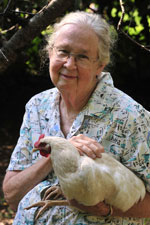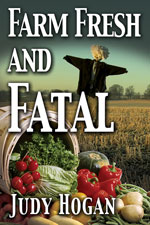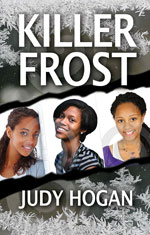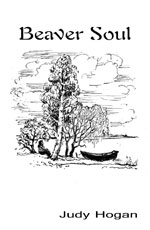
Judy Hogan; Photo by Mark Schmerling
Judy Hogan has led the writing life for fifty years. In October 2013 one publisher released her second mystery, Farm Fresh and Fatal, and another her fifth book of poetry, Beaver Soul. She also has written two nonfiction books, founded and served as editor of Carolina Wren Press (1976-1991), and continues to teach courses in writing fiction, poetry, and creative nonfiction (e.g., diary/memoir).Her mystery series reflects her deep roots in social activism and in North Carolina. The first book, Killer Frost (Mainly Murder Press, 2012), involves educational and financial fraud on a historically black college campus, a setting she knows well. Farm Fresh and Fatal focuses on another familiar place, a farmers’ market, with vendors holding different views on sustainable agriculture and genetically modified produce.
I interviewed Judy about why and how she writes mysteries.
Q: You’ve written poetry and prose, nonfiction and fiction. Why did you choose to write traditional mysteries?
I started reading mysteries in 1981, when I was forty-four. My eldest child had gone off to college, and I had a little more time in the evening when I was too tired to work. I began with Golden Age authors my father recommended. He’d been reading them all his adult life, and I’d never understood why. He was a minister who escaped by reading mysteries? A puzzle I now understand. I read Agatha Christie, Dorothy L. Sayers, Ngaio Marsh, Josephine Tey, P.D. James.
In 1990, I was having a writing vacation (to write poetry) on the Gower Peninsula in Wales, and instead of ranging around the cliffs, I was housebound with a sprained ankle. My landlady in the B&B, who could never get me to watch the telly because I wanted to read mysteries, said, “Judy, why don’t you write a murder?” I began to plot one set in a B&B, with my landlady as a character.
I didn’t know I was writing a traditional mystery. It was later in a workshop with Margaret Maron that I learned that. I did try to publish The Sands of Gower. I even had a nice rejection letter from Ruth Cavin, the legendary editor at St. Martin’s. I had always thought that writing poetry was my best genre, and maybe that’s true, but I found mysteries fun to write, and in them I was able to do some things that I couldn’t do in my nonfiction writing. I could invent characters and put them together and see what they would do, and in this way learn things I didn’t know I knew about myself and other people. That’s the magic of fiction for me. I also like happy endings. Some books have tragedy, but there’s still a sense of completion and a transformation.
Q: How did your experience writing essays, memoir, and poetry help you in writing your mysteries?
I think all writing you do helps other writing. I keep a diary, write in it every morning, and that has proved a good way to clear out my mind of trivia. Then I write a poem, an essay, or get ready to write fiction. I had learned in those other forms that I wrote better and more effectively, in a way to touch other people more, if I went deeper, and the part of me that I call the Muse, or the true creativity, came into play. So I came closer to my writing goals. I don’t usually have characters wake me up, but they definitely come alive in my mind. Over the years I had already developed a good relationship with my Muse, and pen to paper had become natural, comfortable.

Mainly Murder Press, 2013
Q: You present issues important to you in your mysteries. Those issues help propel the plot, motivate the characters, and establish the setting. Even so, the mystery dominates the message, and your endings surprise readers. What techniques did you use in conceiving and writing Farm Fresh and Fatal to assure storytelling didn’t cross over into preaching?
The thing about fiction and mysteries in particular is that you have a moral universe. I have a heroine and various admirable characters, and then I have a killer and some characters who are annoying in one way or another. My killers aren’t usually purely evil, but they have become desperate or in some way, lost their perspective or become obsessed. So the basic plot of the mystery serves me to highlight problems in the community that in some way “spawn” a killer.
Once I have my idea of the problem I want to focus on (and I’ve worked on all the ones I take up with the activist side of my personality) and set up the good and bad characters, the murderer and the suspects, the plot tends to highlight the situation in the community that worries me. I like speaking this way about issues, and after being involved in local politics, this suits me better. I often upset people in a grassroots effort because I tend to be blunt, and even the good guys sometimes become pompous and don’t like to hear someone speak the truth. I can speak all the truth I want in my books and make fun of people who annoy me, even kill them off!
Q: You introduce a lot of characters in the early chapters but manage to make each one distinctive. How do you go about choosing and creating characters?
I have an ongoing heroine/sleuth, Penny Weaver, loosely based on me, my age, a poet, with many of my interests, but her voice is a little more satirical than mine. Her lover/husband Kenneth was her first sidekick, and then a character I wholly invented, Sammie Hargrave, an African American, came to life, and I liked her so much that I found her an ideal sidekick, more even than Kenneth, who tends to worry about Penny’s always seeming to end up face to face with the murderer. Sammie also balances Penny’s usually good behavior. Sammie will deceive, take on criminals with karate moves, and is generally ready for anything.
I use Elizabeth George’s Write Away strategies for character and plot development. I write down all the characters I need. After this many books, I already have a lot to choose from, since an interracial group of activists works on issues in my fictional Riverdell.
Actual people sometimes get me going. People are each so different when you get to know them, and their quirks help me make them unique and provide humor, hopefully. My goal is that each one lives individually for the reader. I still work at that, but they come alive better if I know how they talk, behave, what their background is, what their “core need” is and what they do when they can’t have what they believe they need. The Muse helps. I often ask her questions re characters and plot, and she makes suggestions, which I almost always follow. Knowing the characters well helps me plot.
Q: One of your ongoing themes is rocky relationships between mothers and their adult daughters. Are you taking a personal risk here? What do your daughters think of the scenes between Penny, the main character, and her somewhat unstable daughter Sarah?
Oh, my. I’ve given my books to my two daughters, and I don’t think either one has read them, and perhaps they won’t recognize themselves, though they have both, and my son, too, given me pause over the years. In the end my life is richer because my kids gave me a hard time, even to our needing some therapy as a divorced family, to get them raised. Those conflicts are still vivid to me. It’s easy for me to write scenes between adult children and their parents. My oldest is fifty-one, and my youngest is forty-one, and I hope they don’t take offense if/when they read the books. I’m taking the risk.

Mainly Murder Press, 2012
Q: What are you writing now? What’s next?
Saturday, December 7, I wrote the last words of the first draft of Pernicious Poll. It’s about North Carolina’s new harsh voting law, which in its effects is quite discriminatory against African Americans and the poor.
I hope to get the very first mystery I wrote out next. I’ve revised The Sands of Gower, and I think readers will like to go back to when Penny met Kenneth. Tormentil Hall, which comes after Farm Fresh, also takes place on Gower in Wales, and I think the readers need the first novel to enjoy fully the eighth. My publishing sequence is going to be mixed up, but that’s already true.
Q: Many people look forward to leaving their day job and writing mysteries as a second (or even primary) career. What’s the single most important advice you give the person who wants to become a mystery writer?
Love doing it, do it because it makes you happy, whether you sell it or not. Write what you wish to write–the advice of Virginia Woolf, Louise Penny, Carolyn Hart, Elizabeth George. Go for broke, and then get good feedback you trust. It might be a group, or one person. I didn’t find that critique groups worked for me, but I now have two readers. Both love to read mysteries, both are honest but essentially like what I do. That is helping tremendously. They find the things I miss or didn’t make clear. Of course, read good books. The best models make the best writers.
Q: What have been the most satisfying comments on Farm Fresh and Fatal?
I was fortunate to have a blurb from Carolyn Hart: “Farm Fresh and Fatal features an appealing protagonist, an intriguing background, and well-realized characters. Readers will enjoy these characters and empathize with their successes and failures. In the tradition of Margaret Maron.”
A writer friend of mine, Sharon Ewing, wrote one. Your close friends sometimes aren’t that impressed with your writing, but Sharon reviewed the book, quite thoughtfully and appreciatively, on Amazon. She said, “The first sentence of the book plunges into the action that will carry the reader to the fast-paced turns and twists of the final chapter.”
Then recently, November 30, Ruth Moose reviewed it in a little paper in Southern Pines, The Pilot. She wrote, “Hogan writes with passion and knowledge about genetically modified foods that can produce ‘tomatoes that bounce like ping pong balls,’ and the community of those who know and love the earth.” She made my day. Newspaper reviews are hard to get in these times. You can read the full review at http://www.thepilot.com/search/?t=article&s=start_time&sd=desc&d1=5+years+ago&q=Book+Review%3A+Farm+Fresh+and+Fatal.
Judy, thanks you for sharing your expertise.
—Carolyn Mulford

Finishing Line Press, 2013
For information on ordering autographed copies of her mysteries and poetry, email judyhogan at mindspring.com or visit her website (http://judyhogan.home.mindspring.com) or blog (http://postmenopausalzest.blogspot.com).
Copies of her mysteries (in paper and e-book format) are available from major online bookstores and mainlymurderpress.com
Copies of Beaver Soul may be ordered from Amazon (search Finishing Line Press chapbooks) and Finishing Line Press.




